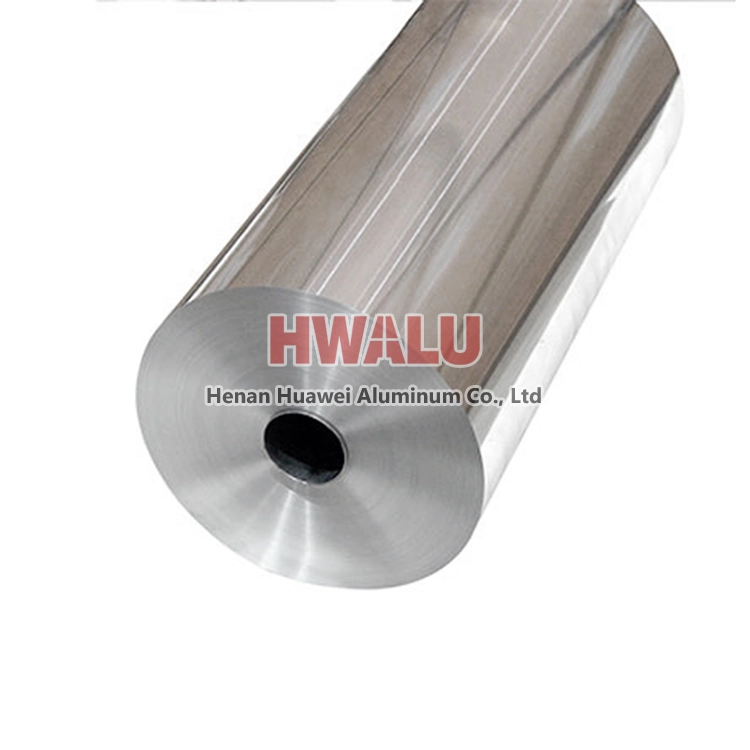What is aluminum foil for pallets Aluminum tray foil is an aluminum foil material used to wrap and cover food trays. This aluminum foil usually has a larger area and a thinner thickness to fit the size and shape of the tray and can resist high temperature and humidity to protect food from contamination and damage. Aluminum foil for trays is widely used in the food service industry, especially in hotels, resta ...
what is Industrial Aluminum Foil? Industrial aluminum foil is a kind of aluminium foil material used in industrial production, which is usually thicker and wider than ordinary household aluminium foil, and is more suitable for harsh industrial environments such as high temperatures and high pressure. Industrial size aluminium foil has good electrical conductivity, thermal conductivity, and corrosion resistanc ...
what is Pure aluminum foil? Aluminum that is 99% pure or higher is called pure aluminum. Primary aluminium, the metal produced in an electrolysis furnace, contains a series of "impurities". However, in general, only iron and silicon elements exceed 0.01%. For foils larger than 0.030 mm (30µm), the most common aluminum alloy is en aw-1050: pure aluminium foil with at least 99.5% aluminium. (Aluminum larger tha ...
What is Aluminum Foil? Aluminum Foil Roll Aluminum foil roll for aluminum foil refers to a raw material used to produce aluminum foil, usually an aluminum foil roll with a certain width and length. Aluminum foil is a very thin aluminum material, its thickness is usually between 0.005 mm and 0.2 mm, and it has good electrical and thermal conductivity and corrosion resistance. Aluminum foil jumbo rolling Aluminu ...
Introduction Welcome to Huawei Aluminum, your premier destination for high-quality 8011 O Temper Aluminum Foil in various micron thicknesses. As a reputable factory and wholesaler, we pride ourselves on delivering top-notch aluminum products that meet and exceed industry standards. In this detailed guide, we will explore the specifications, alloy models, applications, and advantages of our 8011 O Temper Aluminum ...
The rolling oil and other oil stains remaining on the surface of the foil, which are formed on the foil surface to varying degrees after annealing, are called oil spots. The main reasons for oil spots: high degree of oil in aluminum foil rolling, or inappropriate distillation range of rolling oil; mechanical oil infiltration in aluminum foil rolling oil; improper annealing process; excessive oil on the surface ...
Household foil is widely used in cooking, freezing, preservation, baking and other industries. The disposable aluminum foil paper has the advantages of convenient use, safety, sanitation, no odor and no leakage. In the refrigerator or freezer, aluminum foil can be directly wrapped on the food, which can keep the food from deformation, avoid the water loss of fish, vegetables, fruits and dishes, and prevent the le ...
Aluminum foil lunch box is not a new thing, but it is really the last two or three years is particularly active. In particular, the hot sealing aluminum foil lunch box, because it is the first sealed food and then high-temperature cooking disinfection, in the consumer to open the taste before the maximum ensure food safety and health, full tightness, and high barrier can also be a good lock food flavor. Even i ...
Aluminum foil jumbo roll: Ideal for cooking or baking large dishes such as roasts, turkeys or baked cakes as it covers the entire dish with ease. Ideal for wrapping leftovers or storing food in the freezer, as you can cut the desired length of foil as needed. Aluminum foil jumbo rolls can last for a long time, which can save costs in long-term use. Small rolls of aluminum foil: More portable an ...
For the capsule shell, because it is made of aluminum, aluminum is an infinitely recyclable material. Capsule coffee generally uses an aluminum casing. Aluminum is the most protective material at present. It can not only lock the aroma of coffee, but also is light in weight and high in strength. At the same time, aluminum protects the coffee from foreign substances such as oxygen, moisture and light. For cof ...
Material selection: The material of aluminum foil should be high-purity aluminum without impurities. Choosing good quality materials can guarantee the quality and service life of aluminum foil. Parent roll surface treatment: In the early stage of aluminum foil production, the surface of the parent roll needs to be cleaned and decontaminated to ensure a smooth and flat surface and avoid oxide layers and ble ...







